- Home
- Isabel Allende
Ines of My Soul Page 7
Ines of My Soul Read online
Page 7
muttering insults. I kicked and clawed, but he stunned me with a ferocious blow that left me breathless and seeing black for a few instants. When I recovered my senses, he was on top of me, flattening me with his weight, spraying me with saliva, and mumbling filth. I smelled his nauseating breath as his fingers dug into my flesh; he was trying to part my legs with his knee, and I felt his hard sex against my belly. Panic, and the pain of that blow, clouded my senses. I screamed, but he covered my mouth with one hand, smothering me, while with the other he was struggling with my shift and my underdrawers—not at all an easy task because I am strong and was twisting like a weasel. To keep me quiet, he slapped me hard in the face and then used both hands to tear at my clothing. I realized that I would not get anywhere with force. For an instant I contemplated the possibility of giving in to him and hoped that the humiliation would be brief, but I was blind with anger, and I was not sure that afterward he would leave me in peace; he might just as easily kill me to prevent my denouncing him. I had a mouthful of blood, but I was able to beg him not to hurt me and tell him we could both enjoy this, that there was no hurry, and that I was prepared to please him in any way he wished.
I do not remember very well the exact details of what happened next. I believe that I stroked his hair, murmuring a litany of obscenities learned in bed with Juan de Málaga, and that seemed to take the edge off his violence, because he let go of me and stood up to take off his breeches, which had fallen down around his knees. Feeling under the pillow, I found the dagger, which I had kept near me since arriving; I grasped it firmly in my right hand, hiding it by my side. When Romero again climbed over me, I allowed him to get comfortable, clasped both legs around his waist, and put my left arm around his neck. He grunted with satisfaction, thinking I had decided to cooperate, and prepared to seize the moment. In the meantime, I used my legs to immobilize him, locking my feet over his kidneys. I raised the dagger, taking it in both hands and calculating the precise spot that would inflict the greatest harm, and brought it down with all my strength, burying it to the hilt and closing him in a lethal embrace. It is not easy to drive a dagger into a man’s strong back while in that position, but I was aided by terror. It was his life or mine. When for a moment Sebastián Romero did not react, as if he had not even felt the blow, I was afraid I had aimed poorly, but then he gave a visceral howl and rolled off me, tumbling to the floor among the piles of bundles. He tried to get up, but got no farther than his knees, with an expression of surprise on his face that quickly turned to horror. He reached behind him in a desperate attempt to pull out the dagger. What I had learned about the human body while tending wounds in the nuns’ hospital had served me well, because my thrust had been deadly. The man kept flailing about as I sat upright on the cot and watched, as frightened as he, but ready to jump on him if he yelled and stop him however I could. He did not yell again; instead, a sinister little gurgle escaped his lips between rosy spurts of foam. After a time that seemed eternal, he shuddered as if possessed, vomited blood, and then lost consciousness. I waited a long time, until my nerves had calmed and I could think, and until I was sure that he was not going to move again. In the faint light of that single candle I could see that the blood was soaking into the dirt floor.
I waited the rest of the night beside the body of Sebastián Romero, first praying to the Virgin to forgive me for such a grievous crime, and then planning how to keep from suffering the consequences. I did not know the laws of that city, but if they were anything like those in Plasencia, I would be thrown into prison until it could be proved that I had acted in self-defense, something very difficult to do given that the judges always favored the man. I had no illusions. The blame for men’s vices and sins always falls on us women. Who would expect justice for a young woman on her own? They would say that I had invited the innocent sailor to my bed and then murdered him in order to rob him. At dawn, I covered the corpse with a blanket, dressed, and went down to the port where Manuel Martín’s ship was still anchored. The maestro listened to my story to the end, without interrupting, chewing his tobacco and scratching his head.
“It seems that I will have to take charge of this mess, Señora Inés,” he declared when I had finished.
That night he came to my modest little room, bringing with him a sailor he could trust, and between them they carried Romero off wrapped in a length of sail. I never knew what they did with him. I imagine they threw him into the sea, weighed down by a rock, and that the fish took care of his remains. Martín suggested that I leave Cartagena as soon as possible. A secret like mine could not be hidden indefinitely, and so only a few days later I bid my niece and her husband good-bye and left with two other travelers for the city of Panamá. Several Indians carried our baggage and acted as guides through mountains, forests, and rivers.
The isthmus of Panamá is a narrow strip of land that separates our European ocean from the South Sea, which is now called the Pacific. It is less than twenty leagues across, but the mountains are precipitous, the jungle very thick, the water unhealthful, the swamps foul, and the air infested with fever and pestilence. There are hostile Indians, caimans, and water and land snakes, but the landscape is magnificent and the birds unbelievably beautiful. As we progressed, we were accompanied by the chatter of the curious and bold monkeys that liked to jump on us and steal our provisions. The jungle was a deep, dark, threatening sea of green. My fellow travelers carried their weapons in their hands and, just as Padre Gregorio had warned us, never took their eyes off the Indians who at the first careless moment would have turned on us. He had also warned us about the caimans that drag their victims to the bottom of the river; the red ants that come in waves of thousands and crawl into all your bodily orifices, devouring you from the inside in a matter of minutes; and the toads that can blind you with their poisonous spit. I tried not to think about any of that because it would have paralyzed me with fright. Just as Daniel Balalcázar said, it makes no sense to suffer in advance a misfortune that may never occur.
We made the first part of the trek in a boat rowed by eight natives. I was grateful that my niece was not present, for the men were totally naked. The truth is that despite the magnificent scenery, my eyes strayed to places they should not have gone. The third section of the trip was made on mule back, and when we climbed the last peak we could see the turquoise sea and the hazy outlines of the city of Panamá, suffocating in a hot mist.
TWO
America, 1537–1540
PEDRO DE VALDIVIA was thirty-five years old when he and Jerónimo de Alderete reached Venezuela—“Little Venice,” the first explorers ironically called it when they saw its swamps, canals, and huts on stilts. Valdivia had left the delicate Marina Ortiz de Gaete behind, with the promise either to return a rich man or to send for her as soon as it was possible—little consolation for the abandoned young woman. He had spent everything he had, and gone into debt besides, to finance the voyage. Like everyone who came adventuring in the New World, he had invested his wealth, his honor, and his life in the undertaking, although all the conquered lands, and a fifth of the wealth—were there any to be had—belonged to the Spanish Crown. As Belalcázar had said, with the king’s authorization, the adventure was termed a conquest; without it, it was armed assault.
The beaches of the Caribbean, with their blue waters, opalescent sand, and elegant palm trees welcomed travelers with deceptive tranquility, for as soon as they stepped into the undergrowth, they were absorbed by a nightmarish jungle. They had to slash a path with machetes, dazed by humidity and heat, constantly besieged by mosquitoes and animals they had never seen before. They slogged through swampy ground where they sank up to their thighs in stinking slime, weighed down, clumsy, covered with disgusting leeches that sucked their blood, but unable to remove their armor for fear of the poisoned darts of the Indians trailing them, silent and invisible in the undergrowth.
“We cannot be captured by these savages!” Alderete warned, and reminded the others that the conquistador Franci
sco Pizarro, on his first expedition to the south of the continent, had with a party of his men come across an empty village in which fires were still burning beneath a number of large clay pots. The starving Spaniards took off the lids and revealed the ingredients of the soup: human heads, hands, feet, and viscera.
“That happened west of us, when Pizarro was looking for Peru,” put in Pedro de Valdivia, who considered himself well informed on discoveries and conquests.
“On this side the Carib Indians are cannibals too,” Jerónimo insisted.
It was impossible to determine their location in the absolute greenness of this primitive world that predated Genesis, an infinite, circular labyrinth outside of time, outside of history. If they strayed a few feet from the banks of the rivers, the jungle swallowed them up forever—which happened to one of the men, who plunged into the tall ferns calling his mother, maddened by anguish and fear. The men were silenced, oppressed by an abysmal loneliness, a sidereal anguish. The river was infested with piranhas, which at the scent of blood rushed in schools to end a Christian’s days in a matter of minutes, leaving nothing but clean white bones as sign that he once existed.
In all that lush growth, there was nothing to eat. Their provisions soon ran out, and hunger was added to their suffering. Occasionally they were able to catch a monkey and eat it raw—in that endless damp it was next to impossible to light a fire—nauseated by its human resemblance and its stench. They ate unfamiliar fruit, which made them deathly ill and for days kept them from making headway, weakened as they were by vomiting and watery bowels. Their bellies swelled, their teeth fell out, they were racked with fever. One man died bleeding through every orifice, including his eyes; another was lost in a pit of quicksand; and a third was crushed by an anaconda, a monstrous water snake as big around as a man’s leg and as long as five lances laid end to end. The air was like hot steam, rotten, noxious—a dragon’s breath. “This is Satan’s kingdom,” the soldiers swore, and it must have been so, for they grew quick to anger and fought at every turn. Their captains found themselves hard put to maintain discipline and force them to continue. Only one inducement kept them moving: El Dorado.
As they fought their way forward, Pedro de Valdivia’s faith in the venture faded and his frustration mounted. This was not what he had dreamed of in the boredom of his family home in Extremadura. He was prepared to confront savages in heroic battles and to conquer remote regions for the glory of God and the king, but he had never imagined he would use his sword—the victorious sword of Flanders and Italy—to hack his way through a jungle. He was revolted by the cupidity and cruelty of his companions; there was nothing honorable or idealistic in that brutal group. Except for Jerónimo de Alderete, who had given more than enough proof of his nobility, his fellows were ruffians of the lowest sort, treacherous and quarrelsome. The captain at the head of the expedition, whom Valdivia immediately detested, was heartless: he stole, he treated the Indians like slaves, and he did not pay the quinto, the fifth owed to the Crown. “Where are we going, with such anger and desperation, when in the end none of us can take the gold with us to the tomb?” Valdivia wondered, but he kept on because he could not turn back.
This senseless adventure lasted several months, until finally Pedro de Valdivia and Jerónimo de Alderete were able to split away from the ill-starred party and take a ship to the city of Santo Domingo, on the island of Española, where they took some time to recover from the ravages of the trek. Pedro used the opportunity to send Marina a little money he had saved, as he would continue to do till he died.
They were in Santo Domingo when the news reached the island that Francisco Pizarro needed reinforcements in Peru. His partner in the conquest, Diego de Almagro, had gone off to the extreme south of the continent with the idea of taming the barbaric lands of Chile. The two men were unlike in temperament: the first was somber, suspicious, and envious, though courageous, and the second was frank, loyal, and so generous that he wanted a fortune only to be able to share it. It was inevitable that men so different, though equally ambitious, would have a falling out, even though they had sworn to be loyal to each other before the altar, each taking half of the same host. The Inca empire was too small to hold them both. Pizarro, who had been given the title of marqués gobernador y caballero de la Orden de Santiago, stayed in Peru, aided by his fearsome brothers, while in 1535, Almagro, with an army of five hundred Spaniards, ten thousand Yanacona Indians, and his own title of Adelantado, started out for Chile, a still unexplored region whose name in Aymará means “where the land ends.” To finance the trip he spent from his private fortune more than the Inca Atahualpa had paid for his own ransom.
As soon as Diego de Almagro left with his men for Chile, Pizarro was faced with widespread insurgency. Seeing the forces of the viracochas—the Peruvians’ name for Spaniards—divided, the Indians rose up against the invaders. Without help, and soon, the conquest of the Inca empire would be endangered, as well as the lives of the Spaniards, who were forced to contend with numbers far greater than their own. When Francisco Pizarro’s call for aid reached Española, Valdivia heard it, and without a moment’s hesitation decided to go to Peru.
For Pedro de Valdivia, the mere name—Peru—evoked visions of inconceivable riches, along with a picture of the refined civilization his friend Alderete had described with such eloquence. In fact, he had thought when he heard Alderete’s account that it was a civilization to be admired, even though not everything about it was worthy of praise. He knew that the Incas were cruel, and that they were ferocious in controlling their people. After a battle, if the vanquished did not accept being absorbed into the empire, no captive was left alive, and at the least hint of discontent entire villages were relocated a thousand leagues away. They tortured their enemies, including women and children, in horrible ways. The Inca, who wed his sisters in order to guarantee the purity of the royal blood lines, was the divinity incarnate, the soul of the empire—past, present, and future. Of Atahualpa it was said that he had thousands of maidens in his seraglio and an uncountable number of slaves, that he enjoyed personally torturing prisoners, and that he often cut the throats of his ministers with his own hand. The faceless, voiceless people lived in subjection; their destiny was to labor from childhood to death to benefit the orejones—the priests, military, and members of the court—who lived in Babylonian splendor while an ordinary man and his family barely survived, living off a piece of land they occupied but did not own. The Spanish reported that many Indians practiced sodomy—a sin punished with death in Spain—even though the Inca rulers had forbidden it. There were many tales of sexual excess in the Inca society, proof of which could be found in the erotic ceramics adventurers showed in taverns for the entertainment of the customers, who had never suspected that there were so many ways to disport themselves. It was also reported that a mother broke her daughter’s hymen with her finger before giving her to a man.
Valdivia found nothing wrong in aspiring to the fortune he might find in Peru. Riches, however, were not his incentive; that came from feeling it his duty to fight beside his fellows and his desire to achieve the glory that had until then been so evasive. A sense of honor distinguished Valdivia from others who had joined the expedition to go to Pizarro’s aid; they were dazzled by the gleam of gold. This is what Valdivia himself told me, many times, and I believed him because his behavior would have been consistent with the other decisions of his life. Years later, driven by idealism, he sacrificed the security and wealth he had finally obtained in an attempt to conquer Chile, which Diego de Almagro had in the end failed to accomplish. Glory, always glory, that was the lodestar of his life. No one loved Pedro more than I did; no one knew him better than I, which is why I can speak of his virtues, just as later I must refer to his defects, which were not minor. It is true that he betrayed me and behaved in a cowardly fashion with me, but even the most valiant and honorable men sometimes fail their women. And I can speak with authority when I say that Pedro de Valdivia was one of the most va
liant and honorable men among all those who have come to the New World.
Valdivia traveled to Panamá by land, and from there, in 1537, along with four hundred soldiers, sailed to Peru. The journey took a couple of months, and when he reached his destination the Indians’ uprising had already been subdued by the opportune arrival of Diego de Almagro, who had returned from Chile in time to join his forces with those of Francisco Pizarro. Almagro had crossed icy peaks in his advance toward the south; he had survived incredible hardships and had returned across the hottest desert on the planet, a ruined man. His expedition to Chile had reached the Bío-Bío, the same river along which the Incas, seventy years before, had retreated when they had unsuccessfully tried to take the land of the Indians of the south, the Mapuche. The Incas, like Almagro and his men, had been stopped by these warring people.
Mapu-ché, “people of the earth,” they call themselves, although now they are called Araucanos, a more sonorous name given them by the poet Alonso de Ercilla y Zúñiga, who took it from who knows where—perhaps from Arauco, an area farther to the south. I intend to call them Mapuche—the word has no plural in my language—until I die, since that is how they call themselves. It does not seem just that their name was changed only to make it easier to rhyme: araucano, castellano, hermano, cristiano, and on and on for three hundred quartos. Alonso was a runny-nosed boy living in Madrid when we first Spaniards fought on this soil. He came to the conquest of Chile a little late, but his verses will tell the epic story through the centuries. When there is nothing left of the spirited founders of Chile, not even the dust of our bones, they will remember us through the work of that young man who, in his eagerness to make his lines rhyme, is not always faithful to the facts. Furthermore, he does not always present us in the best light. I fear that many of his admirers will have a slightly erroneous impression of what the war of the Araucanía was.

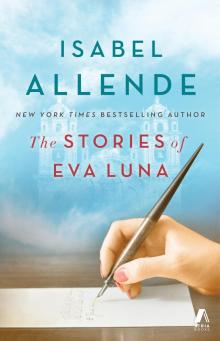 The Stories of Eva Luna
The Stories of Eva Luna The House of the Spirits
The House of the Spirits Paula
Paula Ines of My Soul
Ines of My Soul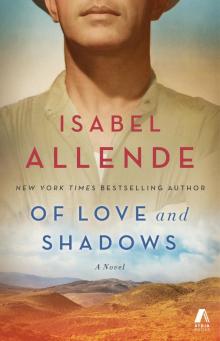 Of Love and Shadows
Of Love and Shadows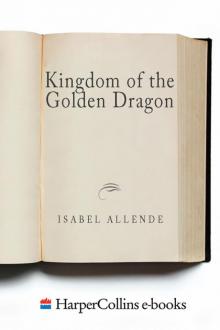 Kingdom of the Golden Dragon
Kingdom of the Golden Dragon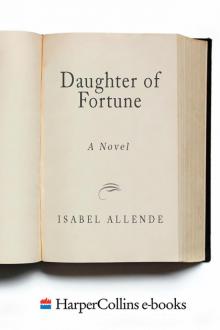 Daughter of Fortune
Daughter of Fortune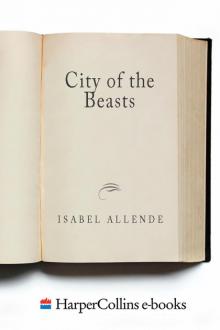 City of the Beasts
City of the Beasts Maya's Notebook
Maya's Notebook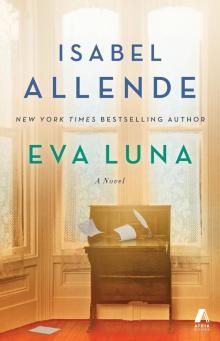 Eva Luna
Eva Luna Zorro
Zorro In the Midst of Winter
In the Midst of Winter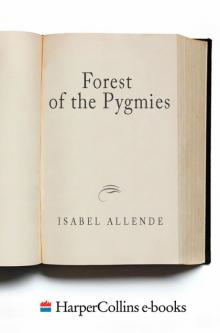 Forest of the Pygmies
Forest of the Pygmies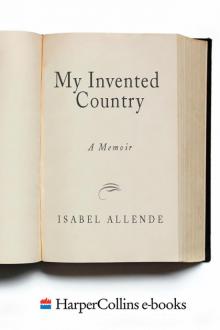 My Invented Country: A Nostalgic Journey Through Chile
My Invented Country: A Nostalgic Journey Through Chile The Japanese Lover
The Japanese Lover Portrait in Sepia
Portrait in Sepia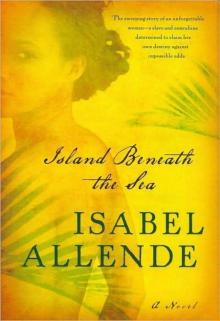 Island Beneath the Sea
Island Beneath the Sea The Soul of a Woman
The Soul of a Woman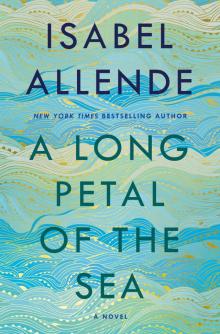 A Long Petal of the Sea
A Long Petal of the Sea Ines of My Soul: A Novel
Ines of My Soul: A Novel The Sum of Our Days
The Sum of Our Days